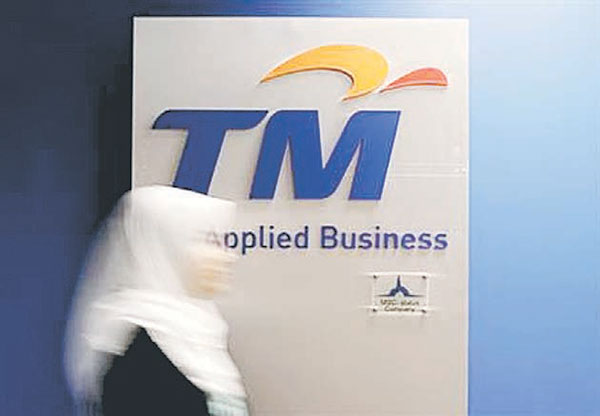
The group has revised its UniFi packages since last October and offering RM179 per month onwards for 30Mbps. — Reuters photo
KUCHING: Telekom Malaysia Bhd (TM) is on track to deliver and striving to outshine the authority’s HSBB and SUBB targets again by end-current year 2016 (CY16), the research arm of Kenanga Investment Bank Bhd (Kenanga Research) says, adding that the group’s mobile arm is progressing well and on-track to launch its mobile services later this year.
According to Kenanga Research, despite the HSBB2 and SUBB agreements with the authority inked only in mid- December last year, TM has delivered and exceeded the government’s targets by providing access to circa 185,000/150,000 (versus circa150,000/117,000 that was set by the lawmaker), respectively, as of end-CY15.
The research arm noted that with vast technical experience gained in the previous HSBB project, TM is aiming to outshine the authority’s targets (circa 250,000/222,000 premises passed in the HSBB2 and SUBB, respectively) again in end-CY16.
“By assuming the current HSBB’s take-up rate of 44 per cent, this suggests that TM’s broadband subscribers’ base could potentially increase by another 208,000 customers by year-end, all else being equal,” it said.
The research arm further noted that, under HSBB 2, 95 additional exchanges will be HSBB-ready providing access to 390,000 premises by 2017, whilst SUBB involves delivering high-speed broadband access (up to 20 megabits per second (Mbps) through copper line upgrades and up to 100Mbps for areas deployed with Fibre-to-the-Home technology) to over 420,000 premises by 2019.
Kenanga Research highlighted that as of end-CY15, around 56 per cent of the group’s 2.34 million broadband customers were on the package of 4Mbps and above, of which 386,000 (or 46 per cent out of the 839,000 UniFi subscribers) were subscribed for 10Mbps and above packages.
The research arm pointed out that average revenue per user (ARPU)-wise, Streamyx’s net ARPU merely stood at RM89 versus UniFi’s blended ARPU of RM190, thus suggesting plenty of rooms for up-selling.
“The group has revised its UniFi packages since last October and offering RM179 per month onwards for 30Mbps under the Advance packages as compared to the terminated VIP5-20Mbps plans priced at RM158 per month onwards previously,” Kenanga Research said.
All in all, while the research arm maintained its financial year 2016/2017 estimate (FY16/FY17E) UniFi subscribers base assumption at one million/1.2 million, estimated ARPUs have been revised up marginally to RM194/RM198 (versus RM190 each previously), respectively.
On TM’S mobile services launching target, Kenanga Research noted the group highlighted that its mobile arm – P1, is progressing well and on-track to launch its mobile services in the second half of 2016 (2H16).
“Followed the recent signing of the domestic roaming agreement with Celcom, TM-P1 customers will be able to roam on Celcom’s 3G network.
“The 4G LTE network, which has yet to be given a brand name, is expected to operate at the frequencies of 850 megahertz (Mhz) and 2.6 gigahertz (Ghz) under the current TM-P1 spectrums,” the research arm said.
It added that TM, meanwhile, also intends to leverage on the group’s Wi-Fi service (which currently has circa 8,000 plus hotspots) following the recent Wi-Fi roaming agreement signed with British Telecommunications PLC, to provide seamless users experience in both LTE and Wi-Fi roaming.
On a side note, Kenanga Research observed that TM has reacted and launched a new 100Mbps fibre plan, UniFi Pro plan last week after both Time dotCom Bhd (TDC) and Maxis announced speed upgrades to their respective fibre plans recently.
“The plan is charging RM329 per month (or RM399 per month for the Biz Pro) after the promotion campaign (at RM299 per month) expires at end-June,” it said.
“The price tag, however, is rather pricey as compared to TDC, which merely charge RM149 per month for 100Mbps (or RM299 per month for the 500Mbps plan) for symmetrical upload and download speeds but is circa 17 per cent cheaper than Maxis 100Mbps plan.”
Despite the aggressive pricing plans offered by TDC, Kenanga Research believed the threat to TM is limited for now due to the former limited coverage areas (circa 250,000 homes mainly located in high density areas, i.e. commercial areas/condominiums versus UniFi’s 1.8 million home premises passed under the group’s HSBB footprint).
“Having said that, the current 100Mbps connectivity is the maximum available speed under the current HSBB project and requires additional capex to upgrade its equipment (which we understand that the group has no immediate plan for now) should TM decided to offer higher-speed fibre plans in the future,” the research arm added.
